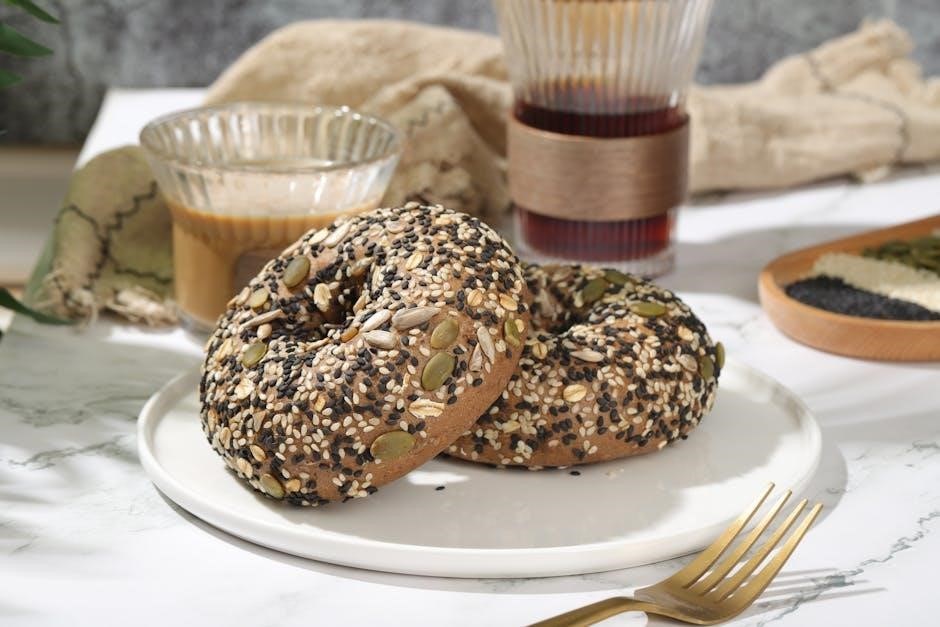Bruegger’s Bagels Nutrition PDF provides detailed insights into the nutritional content of their bagels, including macronutrients, vitamins, and allergens․ It helps consumers make informed dietary choices․
1․1 Overview of Bruegger’s Bagels
Bruegger’s Bagels is a renowned bakery chain specializing in traditional New York-style bagels, known for their chewy texture and distinctive flavor․ The brand emphasizes high-quality ingredients and a commitment to freshness, offering a variety of bagel flavors to cater to diverse tastes․ With a focus on nutrition, Bruegger’s provides detailed information through their Nutrition PDF, helping customers make informed choices․ Their menu extends beyond bagels to include coffee, sandwiches, and other breakfast items, making them a popular choice for quick, wholesome meals․ Bruegger’s Bagels has gained a loyal following for its consistent quality and dedication to meeting dietary needs, ensuring their offerings align with modern health-conscious lifestyles․ This overview highlights their dedication to quality and nutrition transparency, as outlined in the PDF․
1․2 Importance of Nutrition Information
The importance of nutrition information lies in its ability to empower consumers to make informed dietary choices․ With growing health consciousness, individuals increasingly seek detailed nutritional data to align their meals with personal health goals․ Bruegger’s Bagels Nutrition PDF serves as a valuable resource, providing insights into calorie counts, macronutrient breakdowns, and allergen details․ This transparency helps customers with dietary restrictions, such as gluten-free or vegan preferences, to identify suitable options․ By offering comprehensive nutrition information, Bruegger’s supports health-conscious decision-making, fostering trust and loyalty among its customers․ Access to such data also aids in portion control and meal planning, making it a crucial tool for maintaining a balanced diet․ This emphasis on nutrition transparency reflects Bruegger’s commitment to customer well-being and satisfaction․

Nutritional Content of Bruegger’s Bagels
Bruegger’s Bagels provide essential nutrients, including carbohydrates, protein, and fiber․ They also contain key vitamins and minerals like iron and B vitamins․ Allergen details are included․
2․1 Macronutrients in Bruegger’s Bagels
Bruegger’s Bagels are primarily composed of carbohydrates, with a single bagel typically containing between 35-45 grams of carbs․ Protein content ranges from 8-12 grams per bagel, depending on the variety․ Fiber content varies but often reaches 3-5 grams, particularly in whole-grain options․ These macronutrients provide energy and support digestive health․ The carb-to-protein ratio makes Bruegger’s Bagels a balanced choice for meals or snacks․ Varieties with added ingredients, such as seeds or dried fruit, may slightly alter macronutrient profiles․ Overall, the macronutrient composition aligns with traditional bagel nutrition, offering a satisfying and energy-sustaining option for consumers․
2․2 Vitamins and Minerals in Bruegger’s Bagels
Bruegger’s Bagels contain essential vitamins and minerals, primarily from enriched flour, which is a key ingredient․ These bagels are a good source of B vitamins, including thiamin, riboflavin, and folic acid, which support energy metabolism and overall health․ They also provide iron, a crucial mineral for blood health, and selenium, an antioxidant that helps protect cells from damage․ Additionally, whole-grain varieties offer more robust mineral profiles, including manganese and phosphorus, which are important for bone health and metabolic functions; The combination of these vitamins and minerals contributes to the nutritional value of Bruegger’s Bagels, making them a wholesome choice for daily consumption․
2․3 Calorie Count per Bagel
Bruegger’s Bagels vary in calorie count depending on the type and ingredients․ A plain bagel typically contains around 260 calories, while whole-grain and flavored varieties may range from 240 to 300 calories․ The Everything Bagel, for instance, has approximately 280 calories․ These values are based on the specific ingredients used, such as enriched flour, water, yeast, and added toppings like sesame seeds or cinnamon raisins․ The Bruegger’s Bagels Nutrition PDF provides precise calorie information for each variety, helping consumers track their dietary intake․ This detailed breakdown is essential for those monitoring their calorie consumption or managing specific dietary needs․ The PDF ensures transparency, making it easier to incorporate Bruegger’s Bagels into a balanced diet․

Ingredients Used in Bruegger’s Bagels
Bruegger’s Bagels are made with enriched flour, water, yeast, and other ingredients like seeds, dried fruits, or cheese, depending on the variety, as detailed in their Nutrition PDF․
3․1 Core Ingredients and Their Impact on Nutrition
Bruegger’s Bagels primarily use enriched flour, water, yeast, and salt․ Enriched flour provides B vitamins and iron, supporting energy metabolism․ Water contributes to texture without adding calories․ Yeast aids digestion, while salt enhances flavor․ Some bagels include seeds or grains, boosting fiber and nutrient density․ These core ingredients ensure a balanced nutritional profile, making Bruegger’s Bagels a wholesome option for various dietary needs․
3․2 Allergens and Special Dietary Considerations
Bruegger’s Bagels contain gluten due to wheat flour, making them unsuitable for those with celiac disease or gluten intolerance․ Some varieties include dairy, eggs, or sesame, which are common allergens․ The Plain Bagel is free from nuts and soy but contains gluten․ For vegan diets, most bagels are plant-based, though some toppings like cream cheese are not․ Bruegger’s offers limited gluten-free options, so those with dietary restrictions should verify ingredients or choose alternative products․ The nutrition PDF provides detailed allergen information to help consumers make safe choices․

Popular Bagel Varieties and Their Nutritional Profiles
Bruegger’s offers various bagel types, each with unique nutritional profiles․ Popular options include Plain, Whole Grain, Cinnamon Raisin, Sesame, and Everything Bagels, each detailing calories, macros, and more․
4․1 Plain Bagel Nutritional Information
A Bruegger’s Plain Bagel provides 140 calories, with 2g of fat, 450mg of sodium, and 2g of dietary fiber․ It contains 30g of carbohydrates and 4g of protein․ Made with enriched flour, water, yeast, and salt, it offers a classic taste with modest nutritional values․ This bagel is a good source of B vitamins like thiamin, riboflavin, and folic acid, supporting energy metabolism․ With no added sugars and minimal fat, it suits low-fat diets․ However, it lacks significant fiber compared to whole-grain options, making it a simpler choice for those seeking a traditional bagel experience without extra toppings or ingredients․
4․2 Whole Grain Bagel Nutritional Information
A Bruegger’s Whole Grain Bagel offers a nutrient-rich option, providing 150 calories, 3g of fat, and 400mg of sodium․ It contains 32g of carbohydrates, 6g of protein, and 6g of dietary fiber, making it a higher-fiber choice compared to the plain bagel․ Enriched with whole wheat flour, it delivers essential B vitamins like thiamin, riboflavin, and folic acid, along with minerals such as iron and selenium․ This bagel supports better digestion and sustained energy levels due to its whole grain composition․ It’s a healthier alternative for those seeking more nutritional value, offering a balance of taste and health benefits while catering to fiber-focused diets․
4․3 Cinnamon Raisin Bagel Nutritional Information
A Bruegger’s Cinnamon Raisin Bagel provides 150 calories, with 2g of fat and 350mg of sodium․ It contains 34g of carbohydrates, including 5g of sugar from the raisins, and 5g of protein․ The bagel offers 2g of dietary fiber, contributing to better digestion․ Enriched with wheat flour, it includes B vitamins like thiamin, riboflavin, and folic acid, as well as iron․ The raisins add natural sweetness and antioxidants․ Compared to the Plain Bagel, this variety has slightly more sugar but retains a balanced nutritional profile․ It’s a flavorful option for those seeking a sweeter bagel without excessive nutritional compromise, making it a delightful yet relatively healthy choice․
4․4 Sesame Bagel Nutritional Information
A Bruegger’s Sesame Bagel contains 150 calories, with 4g of fat and 350mg of sodium․ It provides 34g of carbohydrates, including 2g of dietary fiber, and 7g of protein․ The sesame seeds add a nutty flavor and contribute to its nutritional profile, offering calcium and a hint of healthy fats․ This bagel is a good source of iron and B vitamins from the enriched wheat flour․ With no added sugars, it’s a satisfying option for those seeking a slightly savory bagel․ The combination of sesame seeds and whole grains makes it a nutrient-rich choice, ideal for pairing with spreads or toppings for a balanced meal․ Its moderate calorie count and varied nutritional benefits make it a popular pick for health-conscious consumers․

4․5 Everything Bagel Nutritional Information
A Bruegger’s Everything Bagel contains 160 calories, with 5g of fat and 400mg of sodium․ It provides 35g of carbohydrates, including 3g of dietary fiber, and 7g of protein․ The Everything Bagel features a blend of sesame seeds, poppy seeds, dried garlic, and salt, enhancing its flavor and nutritional profile․ The sesame seeds contribute calcium and healthy fats, while the poppy seeds add trace minerals like manganese․ This bagel is a good source of iron and B vitamins from the enriched wheat flour․ With its robust taste and balanced macronutrients, it’s a versatile option for various toppings․ The combination of seeds and whole grains makes it a nutrient-dense choice, ideal for those seeking a hearty and flavorful bagel option․
Health Benefits of Bruegger’s Bagels
Bruegger’s Bagels offer high fiber content for digestive health, protein for muscle support, and antioxidants for overall wellness, making them a nutritious choice for balanced diets․
5․1 High Fiber Content and Digestive Health
Bruegger’s Bagels are a good source of dietary fiber, which plays a crucial role in maintaining digestive health․ Fiber helps regulate bowel movements, preventing constipation and promoting a healthy gut․ A high-fiber diet can also support the growth of beneficial gut bacteria, enhancing overall digestion․ Additionally, fiber contributes to feelings of fullness and satisfaction, aiding in weight management․ With options like whole grain bagels, Bruegger’s provides varieties that are particularly rich in fiber, making them a nutritious choice for those seeking to improve their digestive well-being and overall health through balanced nutrition․
5․2 Protein Content and Muscle Health
Bruegger’s Bagels offer a modest amount of protein, making them a suitable option for those focused on muscle health and repair․ Protein is essential for building and maintaining muscle tissue, and even a small intake can contribute to daily needs․ While not exceptionally high in protein, certain varieties like whole grain or everything bagels may offer slightly higher amounts․ Pairing Bruegger’s Bagels with protein-rich toppings such as peanut butter, hummus, or lean meats can enhance their muscle-supporting benefits․ This makes them a versatile choice for fitness enthusiasts and individuals aiming to balance their diet with adequate protein for muscle health and overall wellness․
5․3 Antioxidants and Overall Wellness
Bruegger’s Bagels contain antioxidants that contribute to overall wellness by protecting the body from oxidative stress and inflammation․ Ingredients like whole grains, raisins, and sesame seeds provide natural antioxidants, including vitamin E and selenium․ These compounds help maintain cell health and support immune function․ The presence of antioxidants in Bruegger’s Bagels makes them a beneficial addition to a balanced diet, promoting long-term health and well-being․ Regular consumption of antioxidant-rich foods can also aid in reducing the risk of chronic diseases, making Bruegger’s Bagels a wholesome choice for health-conscious individuals seeking to incorporate nutritious, antioxidant-rich options into their meals․
Comparing Bruegger’s Bagels to Other Brands
Bruegger’s Bagels stand out for their high-quality ingredients and balanced nutritional profiles, offering competitive calorie and macronutrient content compared to other brands, ensuring a healthier choice․
6․1 Nutritional Differences from Competitors
Bruegger’s Bagels often have fewer calories and less fat compared to competitors, with a focus on whole grains and natural ingredients․ They offer a higher fiber content, which supports digestive health and provides a feeling of fullness․ Additionally, Bruegger’s Bagels typically contain fewer added preservatives and artificial flavorings, making them a more wholesome option․ Their protein content is also notable, helping to maintain muscle health; While some competitors may offer gluten-free options, Bruegger’s emphasizes traditional recipes with enhanced nutritional value․ Overall, Bruegger’s Bagels are positioned as a nutrient-dense choice in the bagel market, catering to health-conscious consumers seeking balanced nutrition without compromising on taste․
6․2 Taste and Texture Comparison
Bruegger’s Bagels are known for their distinctive chew and dense texture, achieved through a traditional water-based boiling process before baking․ Their flavor profiles range from classic plain to vibrant options like cinnamon raisin and everything, offering a variety that appeals to diverse tastes․ Compared to competitors, Bruegger’s often has a more robust, authentic bagel taste, with a crunchy crust and soft interior․ Some brands may have a softer, more bread-like texture, while others focus on sweeter or more heavily topped options․ Bruegger’s stands out for its balanced flavor and handcrafted quality, making it a favorite for those seeking a traditional bagel experience with a modern twist․

How to Incorporporate Bruegger’s Bagels into a Healthy Diet
Incorporate Bruegger’s Bagels into a healthy diet by pairing them with nutrient-rich toppings like lean proteins, fresh vegetables, and low-fat spreads to maintain balanced nutrition and satisfaction․
7․1 Portion Control and Balanced Meals
Maintaining portion control is key to enjoying Bruegger’s Bagels as part of a healthy diet․ One bagel typically ranges from 200 to 400 calories, depending on the variety․ Pairing a bagel with nutrient-dense toppings like avocado, lean proteins, or hummus can create a satisfying meal without overindulging․ Balancing your plate with vegetables, whole grains, and a source of protein ensures a well-rounded diet․ For example, a plain or whole-grain bagel with smoked salmon, cream cheese, and capers offers a balanced mix of carbs, protein, and healthy fats․ Always refer to the Bruegger’s Bagels Nutrition PDF for specific calorie counts and serving sizes to make informed choices․ Moderation and variety are essential for a balanced dietary approach․

7․2 Pairing Bagels with Nutritious Toppings
Pairing Bruegger’s Bagels with nutritious toppings enhances their nutritional value and flavor․ Opt for fresh vegetables like cucumbers, tomatoes, and spinach to boost vitamin and fiber intake․ Lean proteins such as turkey, chicken, or tofu add essential amino acids․ Avocado provides healthy fats, while hummus offers plant-based protein and fiber․ For those preferring dairy, low-fat cream cheese or yogurt-based spreads are excellent choices․ Incorporating nuts or seeds adds crunch and a dose of healthy fats and antioxidants․ Always refer to the Bruegger’s Bagels Nutrition PDF for topping options and their calorie contributions․ By choosing wholesome toppings, you can enjoy a delicious and nutritious meal that aligns with your dietary goals․ This approach ensures every bite is both satisfying and healthy․
Frequently Asked Questions About Bruegger’s Bagels Nutrition
Common questions about Bruegger’s Bagels include their vegan and gluten-free options, calorie counts with cream cheese, and specific allergen information․ The Nutrition PDF answers these queries․
8․1 Are Bruegger’s Bagels Vegan?
Bruegger’s Bagels offers some vegan options, but not all varieties are suitable for a vegan diet․ Many bagels contain ingredients like honey, eggs, or dairy products, which are not vegan․ Additionally, some bagels may be processed in facilities that handle animal-derived products, risking cross-contamination․ To adhere to a vegan diet, it’s essential to check the specific ingredients of each bagel variety․ For instance, plain or whole-grain bagels might be vegan-friendly, while others with added toppings like cheese or sesame seeds may not․ Always refer to the Nutrition PDF or consult Bruegger’s directly for the most accurate and up-to-date information․
8․2 Are Bruegger’s Bagels Gluten-Free?
Bruegger’s Bagels are not gluten-free, as they are made with wheat flour, which contains gluten․ The traditional bagel recipe includes ingredients like enriched flour, malted barley flour, and other gluten-containing components․ While some brands offer gluten-free alternatives, Bruegger’s does not currently provide a gluten-free bagel option․ Additionally, their bagels are baked in facilities that handle gluten, risking cross-contamination․ For individuals with gluten intolerance or celiac disease, Bruegger’s Bagels are not a suitable choice․ Always refer to the Nutrition PDF or contact Bruegger’s directly for the most accurate information, as formulations and offerings may change over time․
8․3 How Many Calories Are in a Bruegger’s Bagel with Cream Cheese?
A Bruegger’s Bagel with cream cheese typically ranges between 400 to 500 calories, depending on the bagel variety and the amount of cream cheese․ For example, a plain bagel with cream cheese is approximately 450 calories, while a whole grain or everything bagel with cream cheese may slightly exceed this․ The calorie count includes both the bagel and the cream cheese, with the majority coming from carbohydrates and fats․ For precise nutritional information, it’s best to consult the Bruegger’s Bagels Nutrition PDF, as specific values may vary based on the bagel type and cream cheese serving size․
Bruegger’s Bagels Nutrition PDF offers a comprehensive guide to making informed dietary choices, balancing nutrition and flavor for a healthy, satisfying breakfast or snack option․

